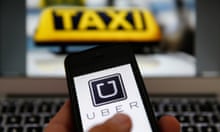Whining about cab drivers transcends national boundaries. From New York to Sydney, the complaints are indistinguishable. Sitting among 450 of the world’s leading labour law scholars at the University of Amsterdam in June, I met a young Belgian scholar who confided that he only used Uber because it provided a superior service. “I never use Belgian cab drivers,” he said. “They are fucking pigs.”
As I journeyed on the fast train from Paris to Amsterdam that week, French newspapers were running hard on protest action and a subsequent strike by French taxi drivers against Uber. Violent attacks on Uber drivers and clients had prompted a public outcry.
Weeks earlier, a California court had ruled against Uber in deciding that its drivers were employees, and thereby entitled to important legal protections. Uber promptly announced an appeal, maintaining that its drivers were independent contractors in business for themselves. A new breed of entrepreneur, no less.
For decades now, hapless judges in different parts of the globe have been wrestling with the task of correctly classifying workers, dutifully trying to apply old employment laws to often complex and elaborate new work arrangements.
The results are a mess, often producing farcical decisions. A low-paid factory worker can go home on Friday only to turn up to the same workplace the following Monday as a contractor – with a pay cut and fewer benefits. Is this the entrepreneurial risk-taking spirit at play? Only in the sense that the unlucky worker assumes the risk of getting sick and not being paid when she is too sick to work.
Uber is merely the latest battle ground for the same debate.
Businesses have been shedding their identity as employers for at least 30 years. For example, back in 1991, the Federal Court of Australia decided that carpenters and labourers supplied by the labour hire company Troubleshooters Available to their client, Odco, were not employees of either company but were in fact independent contractors. The triangular structure (business – labour hire company – independent contractors) meant that these workers assumed a new identity: as self-employed entrepreneurs in business for themselves.
The decision cleared the way for labour hire companies to provide labour to businesses at attractive rates. Pre-existing wage rates, annual leave, sick leave and other employee entitlements were quickly eliminated from the workplace.
In the decades since, there has been a steady growth in these precarious work structures. Hotels have fired their cleaners and housekeepers, replacing them with “contractors” supplied by intermediaries. Low-paid migrant women have suddenly found themselves in business – for themselves, but with fewer rights.
This is how the way we work is being radically transformed: through a combination of restructuring, globalisation and the formidable power of the internet. Businesses are deploying an array of structures by which they can profit from the work performed by others without the cost, risk or aggravation of actually dealing with them.
Academic David Weil has coined the term the “fissured workplace” to describe the phenomenon of business delegating their employing function to other entities, creating intermediaries between the workers and the business profiting from that work.
The intent behind the fissured workplace is to avoid employment laws and thereby cut the cost of labour – usually by about one third. Standard wage rates and other employee entitlements that have been achieved by employees and their unions over decades can be eliminated with remarkable ease, rendering employment laws increasingly irrelevant.
In essence, people formerly known as “employees” have lost that identity to schemes drafted by lawyers and top-tier accountants involving labour hire agencies, dependent and independent contracting, franchising, supply chains and digitalised labour.
The same lawyers and accountants using the same logic are also behind the elaborate tax structures adopted by multinational corporations. Instead of subverting employment laws, those schemes subvert tax laws. Avoiding tax and cutting the cost of labour continue to be key drivers of profitability for demanding shareholders.
Global labour supply chains are de rigeur for many of the world’s most prominent brands, including Apple and Nike. Instead of one intermediary between a company and the workers who make its product, there can be many. This in turn triggers a loss of quality control, by which I mean control over the quality of conditions under which people work. Periodically, big brands find themselves having to engage in damage control: sometimes the workers die, sometimes they work in grossly exploitative environments. Sometimes, they’re children.
As for Uber? Its revolution is actually a reversion to the same triangular labour supply configuration, but with a twist. By dint of the internet, labour hire companies are no longer required. Now what stands between a corporation and the workers who generate its profit is an app.
The implications are profound. If bargaining with a labour hire company is almost impossible, how do you bargain with an app? You’re interested in a career structure? Go tell your iPhone. You preferred being a paid employee with some security of tenure? You’re in the wrong job. Get hip to the gig economy, sister.
Badly paid Uber drivers have replaced badly paid cab drivers, but this will not endure. Driverless cars will eventually mow down Uber. But behind Uber is an army of other tech companies seeking to apply the same methodology to other services and products – cleaners, business consultants, administrators, personal assistants, nurses, lawyers and couriers are all being Uberised. Many more employees will lose their jobs and current remuneration.
Relying on the odd legal challenge or media shaming campaign may be all there is, but it’s about as effective as trying to put out a bushfire with a water pistol. The Economist has correctly identified that current laws are hopelessly inadequate:
“The fundamental problem is that in America, as in many other rich countries, employment law has failed to keep up with the changing realities of modern work.”
Existing employment laws, like current tax laws, in many developed countries are no longer fit for purpose. Employment law needs to be replaced by work law.
Let the debate about its content and how it should operate begin.
Josh Bornstein is an employment lawyer and writer








Comments (…)
Sign in or create your Guardian account to join the discussion